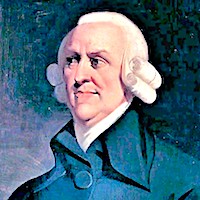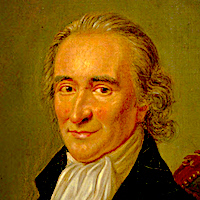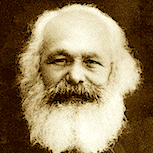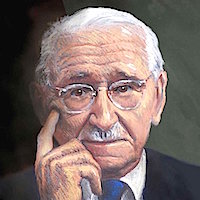

Tao Te Ching

Adam Smith
1723 – 1790 CE
''The Father of Economic Capitalism"
Economic pioneer, moral philosopher, professor, and major influence on the Scottish Enlightenment; Adam Smith helped create the "cult of the free market" when he published The Wealth of Nations—one of the or the most influential books on economic theory ever written. Unlike many famous and influential books that were virtually unknown during the author's life, the Wealth of Nations went through 5 editions while Smith was still living. A close friend and advisor to David Hume, Smith also had frequent conversations with Benjamin Franklin, Gibbon, Burke, and knew Voltaire. He put his economic theories into practice converting his home town of Glasgow's business leaders to his policy of free trade. Kidnapped by gypsies when young, Smith refused the expected ordination after 6 years studying at Oxford, and turned conventional morality upside down by proclaiming being rich as the same thing as having integrity.
Eras
Chinese
Qing dynasty (1644 – 1912 CE)Sources
Unlisted Sources
Quotes by Adam Smith (23 quotes)
“Upon the whole, I have always considered him [David Hume], both in his lifetime and since his death, as approaching as nearly to the idea of a perfectly wise and virtuous man, as perhaps the nature of human frailty will permit.”
Comments: Click to comment
“According to the system of natural liberty, the sovereign has only three duties... first, the duty of protecting the society from violence and invasion; second, the duty of protecting every member of society from every other member of it; third, erecting and maintaining certain public works and institutions... because the profit could never repay the expense to any individual or small number of individuals”
from Wealth of Nations
Comments: Click to comment
“All systems either of preference or of restraint... retards, instead of accelerating, the progress of the society towards real wealth and greatness; and diminishes, instead of increasing, the real value of the annual produce its land and labor.”
from Wealth of Nations
Comments: Click to comment
“If any of the provinces of the British empire cannot be made to contribute towards the support of the whole empire, it is surely time that Great Britain should free herself from the expense of defending those provinces in time of war, and of supporting any part of their civil or military establishments in time of peace, and endeavor to accommodate her future views and designs to the real mediocrity of her circumstances.”
from Wealth of Nations
Comments: Click to comment
“The difference between the most dissimilar characters, between a philosopher and a common street porter, for example, seems to arise not so much from nature, as from habit, custom, and education... By nature a philosopher is not in genius and disposition half so different from a street porter, as a mastiff is from a greyhound”
from Wealth of Nations
Comments: Click to comment
“It is not from the benevolence of the butcher, the brewer, or the baker that we expect our dinner, but from their regard to their own interest. We address ourselves, not to their humanity, but to their self-love”
from Wealth of Nations
Comments: Click to comment
“That part of the produce of the land which is thus necessary for enabling the farmer to continue his business ought to be considered as a fund sacred to cultivation, which, if the landlord violates, he necessarily reduces the produce of his own land, and in a few years disables the farmer”
from Wealth of Nations
Comments: Click to comment
“allowing every man to pursue his own interest in his own way, upon the liberal plan of equality liberty, and justice”
from Wealth of Nations
Comments: Click to comment
“Labor was the first price, the original purchase-money that was paid for all things. It was not by gold or by silver, but by labor, that all the wealth of the world was originally purchased... Labor, therefore, is the real measure of the exchangeable value of all commodities.”
from Wealth of Nations
Comments: Click to comment
“A great stock, though with small profits, generally increases faster than a small stock with great profits. Money, says the proverb, makes money. When you have a little, it is often easier to get more. The great difficulty is to get that little.”
from Wealth of Nations
Comments: Click to comment
“It appears, accordingly, from the experience of all ages and nations, I believe, that the work done by freemen comes cheaper in the end than that performed by slaves”
from Wealth of Nations
Comments: Click to comment
“No society can surely be flourishing and happy, of which the greater part of the members are poor and miserable. It is but equity, besides, that they who feed, cloth and lodge the whole body of the people, should have such a share of the produce of their own labor as to be themselves tolerably well fed, clothed, and lodged.”
from Wealth of Nations
Comments: Click to comment
“Our merchants and master-manufacturers complain much of the bad effects of high wages in raising the price, and thereby lessening the sale of their goods both at home and abroad. They say nothing concerning the bad effects of high profits. They are silent with regard to the pernicious effects of their own gains. They complain only of those of other people.”
from Wealth of Nations
Comments: Click to comment
“The establishment of any new manufacture, of any new branch of commerce, or any new practice in agriculture, is always a speculation, from which the projector promises himself extraordinary profits... If the project succeeds, they [the profits] are commonly at first very high. When the trade or practice becomes thoroughly established and well known, the competition reduces them to the level of other trades.”
from Wealth of Nations
Comments: Click to comment
“Whenever the legislature attempts to regulate the differences between masters and their workmen, its counsellors are always the masters. When the regulation, therefore, is in favor of the workmen, it is always just and equitable; but it is sometimes otherwise when in favor of the masters.”
from Wealth of Nations
Comments: Click to comment
“Corn is a necessity, silver only a superfluity.”
from Wealth of Nations
Comments: Click to comment
“any new law or regulation of commerce ought always to be listened to with great precaution... It comes from an order of men, whose interest is never exactly the same with that of the public, who have generally an interest to deceive and even to oppress the public, and who accordingly have, upon many occasions, both deceived and oppressed it.”
from Wealth of Nations
Comments: Click to comment
“Avarice and injustice are always shortsighted, and they did not foresee how much this regulation must obstruct improvement, and thereby hurt in the long-run the real interest of the landlord.”
from Wealth of Nations
Comments: Click to comment
“A merchant, it has been said very properly, is not necessarily the citizen of any particular country.”
from Wealth of Nations
Comments: Click to comment
“All for ourselves, and nothing for other people, seems, in every age of the world, to have been the vile maxim of the masters of mankind.”
from Wealth of Nations
Comments: Click to comment
“Both in ancient Egypt and Indostan, the whole body of the people was divided into different castes... the caste of the farmers and laborers was superior to the castes of merchants and manufacturers... Though both were extremely populous, yet, in years of moderate plenty, they were both able to export great quantities of grains”
from Wealth of Nations
Comments: Click to comment
“The ultimate goal of business is not to make a profit. Profit is just the means. The goal is general welfare.”
Comments: Click to comment
“Science is the great antidote to the poison of enthusiasm and superstition.”
from Wealth of Nations
Comments: Click to comment
Quotes about Adam Smith (5 quotes)

“Had Mr. Burke possessed talents similar to the author of 'On the Wealth of Nations, he would have comprehended all the parts which enter into, and, by assemblage, form a constitution.”
Comments: Click to comment

“What strikes one here above all is the crudely empirical conception of profit derived from the outlook of the ordinary capitalist, which wholly contradicts the better esoteric understanding of Adam Smith.”
Comments: Click to comment

“Smith's claim that the selfish human urge to increase private profit is the basis for collective wealth is one of the most revolutionary ideas in human history... What Smith says is, in fact, that greed is good, and that by becoming richer I benefit everybody, not just myself. Egoism is altruism.”
Comments: Click to comment

“Adam Smith was the first to perceive that we have stumbled upon methods of ordering human economic cooperation that exceed the limits of our knowledge and perception... We are led—for example by the pricing system in market exchange—to do things by circumstances of which we are largely unaware and which produce results that we do not intend.”
Comments: Click to comment

“What we would call capitalism he despised. People read snippets of Adam Smith, the few phrases they teach in school. Everybody reads the first paragraph of The Wealth of Nations where he talks about how wonderful the division of labor is. But not many people get to the point hundreds of pages later, where he says that division of labor will destroy human beings and turn people into creatures as stupid and ignorant as it is possible for a human being to be. And therefore in any civilized society the government is going to have to take some measures to prevent division of labor from proceeding to its limits.”
Comments: Click to comment
Comments (0)